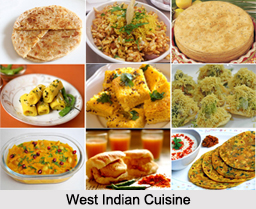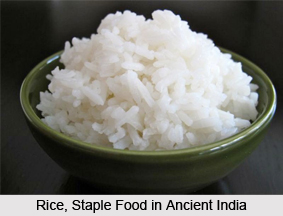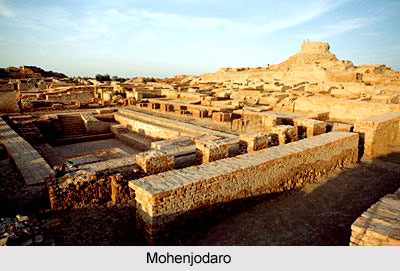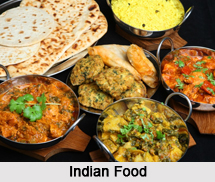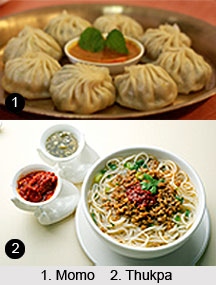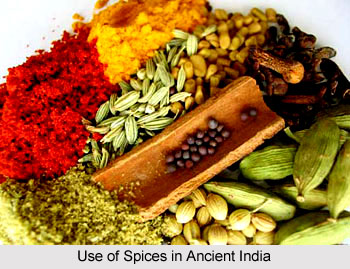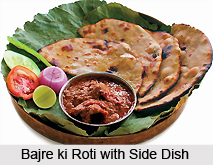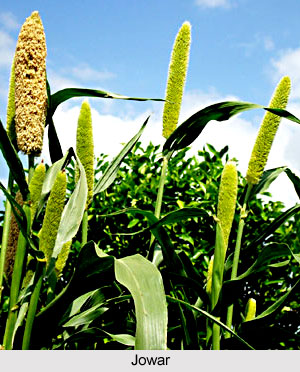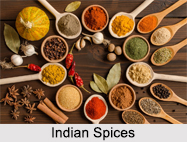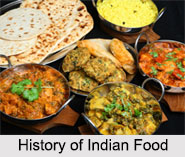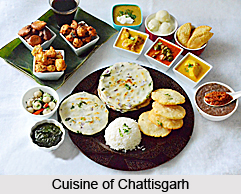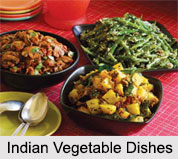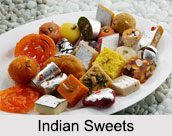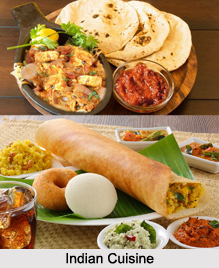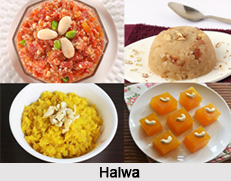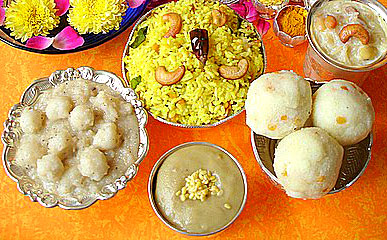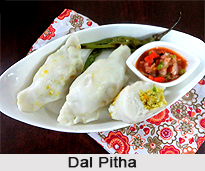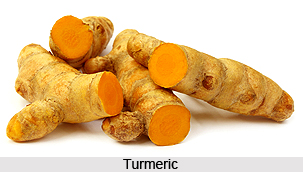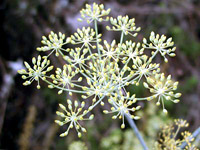 The plant is a biennial or perennial, aromatic, stout, glabrous herb, 1.5 to 1.8 meters high, cultivated in Mediterranean countries, Rumania and India. The seed (or the fruit) is small, oblong, ellipsoidal or cylindrical, 6 to 7 mm long, straight or slightly curved, and of greenish yellow or yellowish brown color; Mesco carp is 5-ridged; it possesses an agreeable, sweet aroma resembling aniseed.
The plant is a biennial or perennial, aromatic, stout, glabrous herb, 1.5 to 1.8 meters high, cultivated in Mediterranean countries, Rumania and India. The seed (or the fruit) is small, oblong, ellipsoidal or cylindrical, 6 to 7 mm long, straight or slightly curved, and of greenish yellow or yellowish brown color; Mesco carp is 5-ridged; it possesses an agreeable, sweet aroma resembling aniseed.
Varieties and races differing in the size, odor and taste of the fruits exists among wild and cultivated fennels, but they are hardly distinguishable from one another; they are regarded as races, varieties or sub species of Foeniculum vulgare. The varieties, which yield commercially important volatile oil, are referred generally to the sub species Capillaceum. Indian fennel is sometimes regarded as a distinct variety, var. panmorium (syn. Foeniculum panmorium).
In India, fennel fruits (seeds as they are known in commerce) are classified for trade purposes according to their place of origin. Some of the well known types are Bombay, Bihar and U.P fennels; seeds from Lucknow are considered to be the best and are priced higher than those from other areas. Commercial samples vary considerably in quality, depending upon the variety or race to which they belong and the care bestowed in harvesting and storing the fruits.
Fennel fruits produced in India are largely consumed within the country. Only small amount is occasionally exported mostly in Asian and African countries.
The composition of fennel seed is given below:
Moisture:6.30 %
Protein:9.5 %
Fat:10 %
Crude fiber:18.5 %
Carbohydrates:42.3 %
Total ash:13.4 %
Calcium:1.3 %
Phosphorus:0.48 %
Iron:0.01 %
Sodium:0.09 %
Potassium:1.7 %
Vitamin B1:9.41 mg/100 g.
Vitamin B2:0.36 mg/100 g.
Niacin:6.0 mg/100 g.
Vitamin C (ascorbic acid):12.0 mg/100 g.
Vitamin A:1040 I.U./100 g.
Calorific value:370 calories/100 g.
The above composition may not be applicable to all types of samples. It may vary considerably depending on various factors.
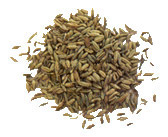 On steam distillation of crushed fennel seed, 0.7 to 6.0 % volatile oil is obtained. The percentage of oil varies considerably, being the lowest in the fruits of Indian origin (0.7 to 1.2 %) and highest in the fruits from Eastern Europe (4.6 to 6.0 %). The essential oil of fennel seed is a colorless or pale yellow liquid with a characteristic taste and odor. Two types of oil are recognized in commerce - sweet fennel oil from the fruits of var. dulce and bitter fennel oil from the fruits of var vulgare. The taste and odor of sweet fennel oil are superior to those of bitter oil. The composition of the oil varies widely according to the variety or race from which the oil has been distilled and according to the region of origin. Indian fennel oil contains over 70 % anethole and 6 % fenchone. It possesses a sweet taste. The main constituent of the oil from the fruits of cultivated Foeniculum vulgare is anethole. Oils of good quality contain 50 to 70 % anethole.
On steam distillation of crushed fennel seed, 0.7 to 6.0 % volatile oil is obtained. The percentage of oil varies considerably, being the lowest in the fruits of Indian origin (0.7 to 1.2 %) and highest in the fruits from Eastern Europe (4.6 to 6.0 %). The essential oil of fennel seed is a colorless or pale yellow liquid with a characteristic taste and odor. Two types of oil are recognized in commerce - sweet fennel oil from the fruits of var. dulce and bitter fennel oil from the fruits of var vulgare. The taste and odor of sweet fennel oil are superior to those of bitter oil. The composition of the oil varies widely according to the variety or race from which the oil has been distilled and according to the region of origin. Indian fennel oil contains over 70 % anethole and 6 % fenchone. It possesses a sweet taste. The main constituent of the oil from the fruits of cultivated Foeniculum vulgare is anethole. Oils of good quality contain 50 to 70 % anethole.
The oil of sweet or Roman fennel fruits contains anethole, d-phellandrene and d-limonene. The high percentage of anethole (up to 90 %) and the absence of fenchone are responsible for its delicate sweet odor and flavor. Terpene less fennel oil is obtained by removing terpenes from sweet fennel oil` Oil from wild variety does not have any commercial importance.
Fennel seeds also contain 9.0 to 13 % fixed oil. The components of fatty acids of the oil are:
Palmitic:4 %
Oleic:22 %
Linoleic:14 %
Petroselinic:60 %.
The oil has Saponification value of 181.2, Iodine value of 99 and Unsaponifiable matter of 3.68 %.
The plant is pleasantly aromatic and is used as a potherb. The leaves are used in fish sauce and for garnishing; leaf stalks are used in salad.
Dried fruits of fennel have a fragrant odor and a pleasant aromatic taste. In India and neighboring countries, they are used as a masticatory or for chewing alone or with betel leaves. They are used for flavoring soups, meat dishes, sauces, liquors, pickles, and bakery products.
The leaves are reported to have diuretic properties. The roots are regarded as purgative; they have an aromatic odor and taste. The fruits are aromatic, stimulant and carminative. They are official in the pharmacopoeias of all countries and are considered useful in diseases of the chest, spleen and kidney. There are a number of medicinal application and is part of many types of medicinal preparations.
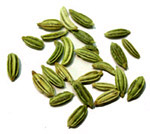 Fennel Uses and Benefits
Fennel Uses and Benefits
Digestive Problems
Fennel has been found to stimulate appetite, and to aid digestion. An infusion prepared by boiling a tablespoon of fennel seeds in 100 ml of water for half an hour, is highly beneficial in indigestion, biliousness, flatulence and constipation.
Fennel Tea for curing Colic
Fennel is one of the safest herb for colic, which helps the baby to release gas and relieve tummy. A teaspoon of the fennel is boiled in a cup of water, and allowed to steep in the water for about 20 minutes. This is strained and allowed to cool. This tea, given to the baby in his feed bottle, helps cure colic.
Fennel is also believed to be beneficial for kidney stones, menopausal problems, nausea, obesity and increasing milk yield during breast feeding. A compression made from an infusion of Fennel tea and placed on the eyelids is reputed to soothe inflamed lids and improve sight.
Botanical name:Foeniculum vulgare Mill.
Family Name :Umbelliferae
Indian names are follows:
Hindi:Saunf, Sonp
Bengali:Mauri,PanMuhuri
Gujarati:Variari
Kannada:Badi-sopu
Malayalam:Perum-jeerakam
Marathi:Badi-shep
Punjabi:Saunf
Sanskrit:Madhurika
Tamil:Shombei
Telugu:Sopu, Pedda-jilakara.
